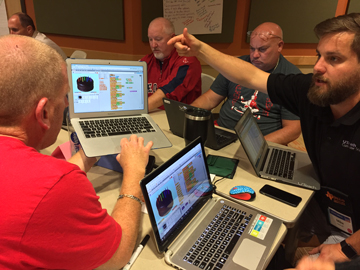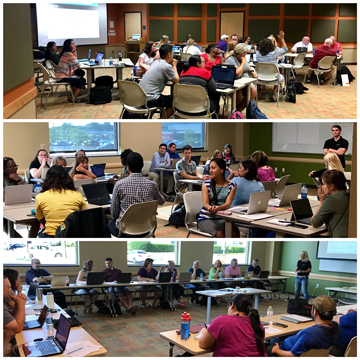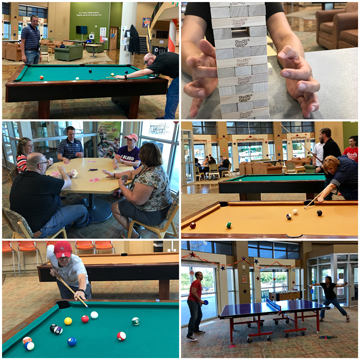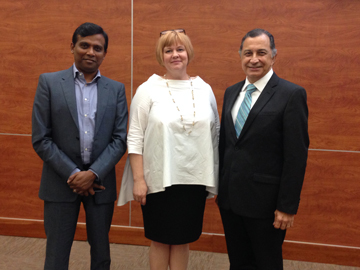Computational Thinking and Collaboration in Big D
by Amy Moreland, UTeach CS Project Coordinator | August 30, 2017
Amy Moreland @UTeachCS is the project coordinator for the UTeach Computer Science program and has been with the UTeach Institute for more than five years. With a background in environmental biology and a passion for formal and informal STEM education, she has remained active and connected to professional science educator associations across Texas.

During a blazing hot week in north Texas, 67 high school teachers from 18 states and 56 school districts (with more than 40% of those teaching in rural locations) attended the UTeach Computer Science Principles training on the University of Texas at Dallas campus, thanks to generous support from Infosys Foundation USA. Eighty percent of these teachers were new to computer science altogether, and more than 60% teach in Title I schools.
After an informal pizza dinner and meet-and-greet on the night of Sunday, July 16, the five-day UTeach CSP Principles professional learning sessions began in earnest on Monday morning and lasted through Friday afternoon. The teachers were divided into three classrooms, each led by two superstar trainers from our veteran UTeach CS "Teacher Leader Corps" teachers.

The agenda for the UTeach CS Principles workshops was packed. In addition to learning the material from the UTeach CSP course, teachers also got up to speed on the AP CS Principles framework and the associated mission to broaden participation in computing. As part of the training, teachers engaged in a project-based learning assignment: Create a useful and visually pleasing program in Scratch, a block-based programming language used in UTeach CS Principles. Even with extensive time dedicated to this task in the workshop, teachers reported working long into the night to perfect their projects. On the last day of the workshop, teachers presented their work in a gallery walk. “The culminating event provided visual evidence of the time and effort this amazing group of educators dedicated to being the best CSP teachers possible,” says UTeach CSP trainer Mike DeGraff.

Due to the close-knit, residential nature of this professional learning week, we had many opportunities to engage and have some fun after classes wrapped up at 5 p.m. each day. On Monday evening, we enjoyed a formal dinner, where Jason Slabodsky, a UTeach CSP trainer, gave a keynote speech about his momentous first year teaching the course, which culminated in his AP CSP students at the Secondary School for Journalism in Brooklyn winning the 2016–2017 Samsung Solve for Tomorrow Contest. “Jason was phenomenal, very inspiring,” said one attendee. Subsequent evenings included a game night and a rousing trivia night hosted by Geeks Who Drink. The winning team name? Short Circuit.
On Thursday, in a joint effort with our UTeach CSP workshops, the National Center for Women & Information Technology’s Counselors for Computing hosted 16 secondary school counselors in their own computational learning workshop. These counselors received information and resources about computing careers and experienced a UTeach CSP “X Marks the Spot” activity. At lunch, the C4C group joined our UTeach CSP teachers and everyone enjoyed the local Richardson High School student panel, as moderated by their dynamic teacher, Henry Vo.

There was a very special closing luncheon on Friday afternoon featuring an informal “fireside chat” between Ravi Kumar, President and COO of Infosys, and Dr. Poras Balsara, Dean of the Jonsson School of Engineering and Computer Science at UT Dallas. They discussed big issues relevant to a room full of CS teachers: the transformation of our lives through technology, jobs of the future, and the critical need for CS education for all.
The participants provided encouraging feedback. “Each day of training was well thought out and our trainers were prepared and organized,” said one attendee. “I learned so much from this conference and the UTeach curriculum. It was also great to collaborate with educators from around the country.”
"In 26 years of teaching and workshops, this has been the best!" says another. "Tons of lesson plans resources, and activities. Facilitators worked well team-teaching and modeling. Other teachers in the group were open, genuine, energetic — all for one, one for all."
With 98% of the attendees committing to teach at least one section of UTeach CSP during the 2017–2018 school year, we estimate more than 1,500 students will be impacted by our curriculum, which is dedicated to broadening participation and engaging young women and students from other historically underrepresented groups.


